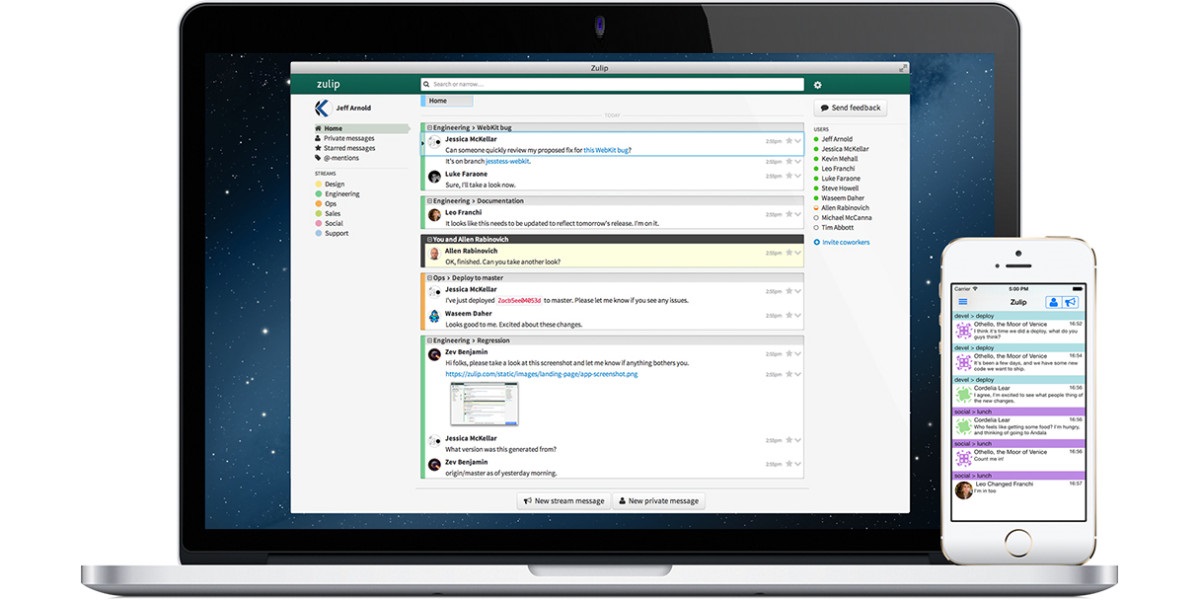
The new server edition of Zulip 2.1 has just been released, which is a platform that functions as a base to deploy suitable corporate messengers to organize communication between employees and development teams.
The system supports direct messages between two people and group discussions. zulip can be compared to the Slack service and considered as an internal corporate counterpart of Twitter, used for communication and discussion of labor problems in large groups of employees.
Funds are provided to track status and participate in various discussions simultaneously using a thread-like message display model, which is the best compromise between linking rooms in Slack and a single Twitter public space. The simultaneous display of all discussions allows you to cover all groups in one place, while maintaining a logical separation between them.
The project was originally developed by Zulip and opened after its acquisition by Dropbox under the Apache 2.0 license. The server-side code is written in Python using the Django framework. Client software is available for Linux, Windows, macOS, Android, and iOS and a built-in web interface is also provided.
What's new in Zulip Server 2.1?
Added a tool to import data from services based on Mattermost, Slack, HipChat, Stride and Gitter. When importing from Slack, support is provided for all the features provided when exporting data by corporate rate plan customers.
To organize a full-text searchnowyou can do it without installing a specialized plugin for PostgreSQL, which allows you to use DBaaS platforms like Amazon RDS instead of the local DBMS.
Access to data export tools has been added to the administrator web interface (previously exported only from the command line).
In addition, it stands out in this new version of Zulip Server 2.1 andl Support for Debian 10 "Buster", Although on the other hand support for Ubuntu 14.04 was discontinued and support for CentOS / RHEL is not finalized yet and will appear in future releases.
We can also find that the email notification system has been completely redesigned, which has been reduced to a minimalist style, similar to the GitHub notification system.
New notification settings have been added which allow to control behavior of push notifications and email notifications for skins (for example, @all), as well as changing the method for counting unread messages.
The implementation of gateway was redesigned to analyze incoming email. Added support for translating Zulip message flows to mailing lists, in addition to previously available tools for integration with Zulip services for sending letters.
Added native authentication support for SAML (security assertion markup language).
Of the other changes:
- Code rewritten for integration with Google Authentication Mechanisms - All social / OAuth authentication backends have been redone using the python-social-auth module.
- In the user interface, the search operator "streams: public" is provided, which provides the ability to search the entire open history of the organization's correspondence.
- Syntax added to Markdown markup to link to discussion topics.
- The moderator settings have been extended to selectively control the rights of users to create and invite their channels.
- The beta testing phase has moved the support for previewing the web pages mentioned in the posts.
- The appearance was optimized, the indentation in lists, citations and blocks with code was specially revised.
- New integration modules with BitBucket Server, Buildbot, Gitea, Harbor and Redmine have been added. Significantly improved formatting in existing integration modules.
How to get Zulip Server 2.1?
For those who are interested in this version for servers, can find the necessary documentation for its implementation, which is very well detailed In the following link.